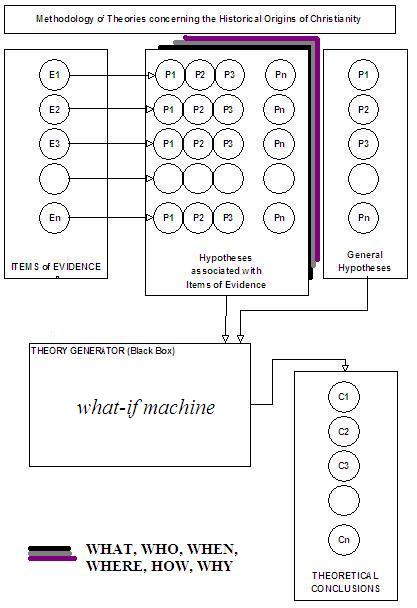
 |
Freethought & Rationalism ArchiveThe archives are read only. |
|
|||||||
|
|
Thread Tools | Search this Thread |
|
|
#381 | |||||
|
Contributor
Join Date: Mar 2006
Location: Falls Creek, Oz.
Posts: 11,192
|
Quote:
You have only outlined trivialities such as this: Quote:
You have already agreed that the Bayesian expression uses e and b. These are defined as: Quote:
Quote:
The hypothesis that "Eusebius existed" is held to be true by the consensus of those who have studied this author, in the implicit sense. They do not need to look up Eusebius on twitter or fb to extend their evidence or their background knowledge about the subject. |
|||||
|
|
|
|
#382 | |||
|
Moderator - General Religious Discussions
Join Date: Dec 2004
Location: New South Wales
Posts: 27,330
|
Quote:
|
|||
|
|
|
|
#383 | ||
|
Contributor
Join Date: Mar 2006
Location: Falls Creek, Oz.
Posts: 11,192
|
some examples of Biblical Scholars using the term "hypotheses about Jesus" explicitly in relation to the field of BC&H.
"hypotheses about jesus" Quote:
Author Interview N.T. Wright, author of The Challenge of Jesus Quote:
Is it necessarily true that the hypotheses about Jesus are logically prior, in fact, to hypotheses about Gospel origins? Why? It is clear with this and other examples that hypotheses about what is thinkable in relation to Jesus must also make provision to include ideas in relation to his historical existence (or mythological existence). This is in addition to hypotheses about the words of Jesus or the actions of jesus or the teachings of jesus or the apostles of jesus, etc. |
||
|
|
|
|
#384 | ||
|
Moderator - General Religious Discussions
Join Date: Dec 2004
Location: New South Wales
Posts: 27,330
|
Quote:
|
||
|
|
|
|
#385 |
|
Contributor
Join Date: Mar 2006
Location: Falls Creek, Oz.
Posts: 11,192
|
Chronology
Separate hypotheses about each of the items of evidence (including people) may also be formulated with respect to chronology. These are supposed to answer the WHEN questions. Ditto for WHERE, HOW and WHY. 
|
|
|
|
|
#386 |
|
Moderator - General Religious Discussions
Join Date: Dec 2004
Location: New South Wales
Posts: 27,330
|
Ignoring the objections to your approach does not make the flaws go away.
|
|
|
|
|
#387 |
|
Contributor
Join Date: Mar 2006
Location: Falls Creek, Oz.
Posts: 11,192
|
There are various historical theories of christian origins and all of them address the existence of Jesus. The following 6 statements appear to summarise the range of conclusions of the bulk of all mainstream and non-mainstream theories about Jesus and Christian origins. (For the purpose of discussion "Christian Origins" here relates to the physical authorship of the books of the canonical new testament, and to the physical authorship of the non canonical books - "Gnostic Gospels, etc")
Mainstream and Non mainstream summary conclusionsThese are the conclusions and approaches being examined. I do not favor any of these, as you may know. Nevertheless I can sketch the basic range of theories that most other investigators (of various kinds) seem to be associated with. All these conclusions are provisional and hypothetical, and all rely on a KNOWN and REASONABLY STATIC evidence base, the major items of which are the books of the canonical new testament, the non canonical books of the new testament, and for matters of chronology, the "History of the Church" by Eusebius. |
|
|
|
|
#388 | |
|
Moderator - General Religious Discussions
Join Date: Dec 2004
Location: New South Wales
Posts: 27,330
|
Quote:
|
|
|
|
|
|
#389 | |
|
Contributor
Join Date: Jun 2000
Location: Los Angeles area
Posts: 40,549
|
Quote:
Is there any reason for this thread to exist in this forum? |
|
|
|
|
|
#390 | ||
|
Contributor
Join Date: Mar 2006
Location: Falls Creek, Oz.
Posts: 11,192
|
Quote:
|
||
|
|
| Thread Tools | Search this Thread |
|